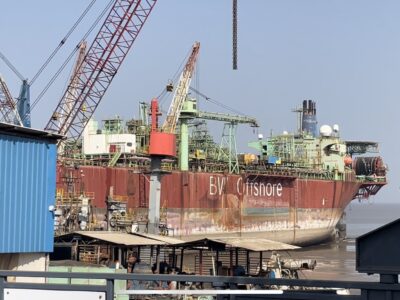SHIP RECYCLING IN ALIAGA UNDER THE SPOTLIGHT
The NGO Shipbreaking Platform has published its report Ship Recycling in Turkey: Challenges and Future Direction. While the publication provides a comprehensive analysis of the current challenges faced by the ship recycling sector in Aliağa, it also underscores the immense potential for driving forward sustainable ship recycling practices and demonstrates a clear path towards achieving this goal.
Turkey stands at a crossroads as the recent announcement of plot sales in October 2023 and the upcoming expiration of public land leases in 2026 create an opening to bring needed change to its ship recycling industry.
Some of the key operational priorities highlighted in the report include putting in place effective drainage channels and the use of oil-water separators for waste water treatment. Additionally, there is a need for third-party verification of hazardous materials during dismantling, proper operations for hazardous waste removal, and the establishment of standards for secure pulling and lifting equipment, along with introduction of proper gas-free operations and cold-cutting techniques.
To ensure adequate oversight of the sector, a comprehensive Environmental Impact Assessment (EIA) is necessary. This assessment should define environmental licensing processes and enforce existing legal instruments for permitting and monitoring, taking into consideration both safety and environmental aspects. It is also important to continuously monitor the environment in and around ship recycling yards to identify sources of pollution and develop effective remediation strategies. Furthermore, occupational health monitoring is required to identify the underlying causes of accidents and work-related illnesses.
Whilst two yards in Aliağa were removed from the EU list of approved ship recycling facilities last year, other non-compliant yards have been allowed to remain listed. As stressed in the report, the lack of governance that allows yards to operate without EIAs or adequate monitoring underscores the necessity for more frequent and unannounced EU inspections, including cross-referencing hazardous waste records and incorporating workers’ perspectives and experience to inform evaluations.
Recognising the pivotal role of the European Union (EU) in driving improvements, the report also recommends strengthening the criteria for ship recycling, including waste management and steel recovery operations, under the EU Ship Recycling Regulation.
Related news

Platform News – NGO Shipbreaking Platform awarded grant by Royal Academy of Engineering and Lloyd’s Register Foundation
Engineering X has awarded nearly £1 million in grants to projects aimed at tackling challenges of decommissioning ships and offshore structures.
... Read More
Platform News – Greenpeace regrets beaching of Rongdhonu (ex Rainbow Warrior II)
The NGO Shipbreaking Platform regrets that the Rongdhonu, former Greenpeace Rainbow Warrior II, has been sold for scrapping on the beaches of Chittagong, Bangladesh. Greenpeace International had… Read More

Press Release – Turkish EU-listed yards shaken by two fatal accidents
In the last four months, the Turkish ship recycling industry has been hit by two serious accidents.
... Read More
Press Release – Toxic aircraft carrier São Paulo rejected by Turkey returning to Brazil
The toxic waste-laden aircraft carrier São Paulo is on its way back to Rio de Janeiro, Brazil. Environmental and labour groups declare victory.
... Read More

